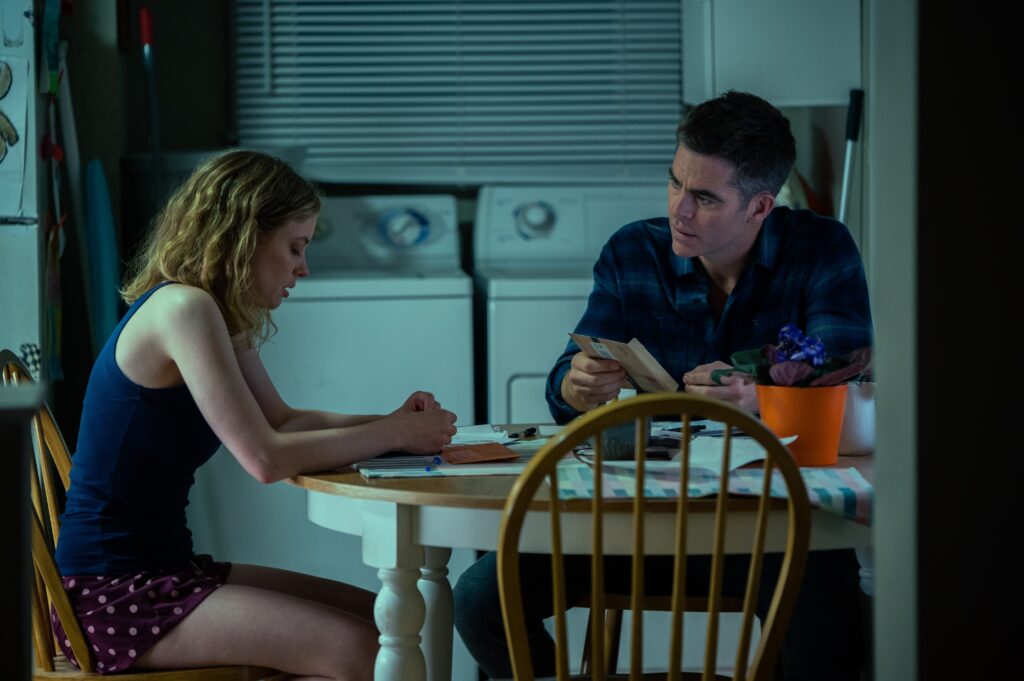October 9, 2022
by Carla Hay

Directed by Todd Field
Some language in German with subtitles
Culture Representation: Taking place primarily in Berlin and New York City, the dramatic film “TÁR” features a cast of predominantly white characters (with some Asians) representing the middle-class and wealthy.
Culture Clash: An internationally famous classical music conductor finds her life spiraling out of control when her past actions come back to haunt her.
Culture Audience: “TÁR” will appeal primarily to people who are fans of star Cate Blanchett, writer/director Todd Field and well-acted movies about powerful people who experience a scandalous fall from grace..

Cate Blanchett’s riveting performance in writer/director Todd Field’s “TÁR” makes it a psychological minefield of a drama. It’s an absorbing portrait of someone intoxicated by her own power and facing a reckoning that’s as unwelcome to her as a nasty hangover. Blanchett’s Lydia Tár character is a classical music conductor who has reached the top of her field, which makes her public downfall such a disastrous mess. Viewers can decide for themselves if this downfall could have been diminished based on how it was handled by the movie’s central character.
“TÁR” is Field’s first movie as a writer/director/producer since his Oscar-nominated 2006 drama “Little Children,” another movie about how a woman is affected by a sex-related scandal. Whereas “Little Children” told the story of a private citizen in a suburban U.S. neighborhood, “TÁR” is about a public figure who is an internationally famous entertainer. “TÁR” had its world premiere at the 2022 Venice International Film Festival in Italy and subsequently had premieres at the 2022 Telluride Film Festival in Colorado, and the 2022 New York Film Festival in New York City.
In “TÁR,” Lydia fits every definition of a type-A personality who’s an overachiever. The movie’s opening scene takes place at The New Yorker Festival, where writer Adam Gopnik (playing a version of himself) is interviewing Lydia in a one-on-one Q&A in front of the audience. It’s a laudatory interview, where her accomplishments are listed like badges of honor: She graduated Phi Beta Kappa from Harvard University. Lydia is also a piano performance graduate of the Curtis Institute, and she has a Ph.D. in musicology from the University of Vienna, specializing in music from the Ucayali Valley in Eastern Peru.
At one time or another, she has been a conductor for all of the “Big Five” American orchestras: New York Philharmonic, Boston Symphony Orchestra, Chicago Symphony Orchestra, Philadelphia Orchestra and Cleveland Orchestra. Lydia is a rare entertainer who is an EGOT winner: someone who has won an Emmy, Grammy, Oscar and Tony. She considers herself to be a New Yorker, and has a home in New York City, where she still visits on a regular basis. However, for the past seven years, Lydia has been living in Berlin, because she has been a conductor for an unnamed German orchestra.
Lydia, who describes herself as a “U-Haul lesbian,” lives with her German domestic partner Sharon Goodnow (played by Nina Hoss) and their adopted Syrian daughter Petra (played by Mila Bogojevic), who is about 6 or 7 years old. Sharon is a violinist in the German orchestra that Lydia conducts. It’s the first sign in the movie that Lydia has a tendency to blur the lines between her job and her personal life.
Lydia is a loner who doesn’t have a close circle of friends, so Sharon is Lydia’s closest confidante. Sharon knows a lot of Lydia’s secrets. However, Sharon eventually finds out that she doesn’t really know everything about Lydia. Two American men also have an influence on Lydia, and they give her advice, whether she wants to hear it or not.
Eliot Kaplan (played by Mark Strong) is an investment banker and amateur conductor, who has financed a non-profit program called the Accordion Conducting Fellowship, which is led by Lydia. The fellowship gives apprenticeships and job opportunities to aspiring female classical music conductors in this very male-dominated field. Near the beginning of the movie, Lydia tells Eliot during a lunch meeting that she’s thinking that the program recipients shouldn’t just be one gender.
The other man who plays an influential role in Lydia’s life is her mentor Andris Davis (played by Julian Glover), who was her predecessor at the German orchestra that Lydia currently conducts. Andris was the one who recommended her for the job, although it’s made clear throughout the movie that Lydia’s talent is so highly respected and sought-after, she probably didn’t need to a recommendation to get the job. What started out as a temporary job for Lydia to be the guest conductor position at this German orchestra turned out to be a long-term, permanent position.
If viewers believe the narrative that Lydia tells people, one of the reasons why she and Sharon decided to settle in Berlin was to be closer to Sharon’s family members who live in the area. But as the story unfolds, it becomes pretty obvious that Lydia might have had a reason to avoid living in New York full-time. It turns out that Lydia has a “stalker” who lives in New York City.
Lydia’s French assistant Francesca Lentini (played by Noémie Merlant) knows who this “stalker” is, because this person has been sending obsessive and threatening email messages to Lydia. Francesca has permission to access these messages, because Francesca screens Lydia’s mail. Francesca is an aspiring conductor who greatly admires Lydia and considers Lydia to be her mentor.
Over time, based on the way that Francesca acts and what she says, Francesca seems to assume that she will be Lydia’s first choice if any big job opportunity comes along that Lydia can help Francesca get. Lydia expects unwavering loyalty from Francesca, but Francesca expects the same loyalty in return. There’s some sexual tension between Lydia and Francesca that will make viewers speculate if or when the relationship between Lydia and Francesca ever became sexually intimate.
Just like a lot of hard-driving, ambitious and accomplished people, Lydia is a perfectionist who is just as hard on herself as she is on other people. A very telling scene is when she is a guest teacher in a classical music class at the prestigious Juilliard School in New York City. The students seem very intimidated by Lydia’s reputation for being merciless in her criticism, but she’s also full of praise for anyone who meets or exceeds her high standards.
During this class session, Lydia singles out a student named Max (played by Zethphan Smith-Gneist) and asks him, “What are you actually conducting?” Max is so nervous in her presence, one of Max’s legs is literally shaking as Max talks to her. However, Max isn’t so afraid of Lydia that Max won’t challenge some of the things that she lectures to the students.
For example, Lydia tells the students any great conductor or musician can find something to relate to in the music of classical icons Johann Sebastian Bach or Ludwig van Beethoven. Max disagrees and tells Lydia and the rest of the people in the room: “As a BIPOC [black, indigenous, or person of color], pan-gender person, it’s impossible to take Bach seriously.”
Lydia tells Max that she doesn’t know what BIPOC and pan-gender means, and her attitude is that she doesn’t care to know. She treats Max dismissively, like an ignorant young person whose opinions matter very little to her, because she’s the more experienced, older person. Finally, a fed-up Max gets tired of feeling belittled by Lydia, and Max walks out of the class. Before leaving the room, Max tells Lydia, “You’re a fucking bitch.”
In response, a stone-faced Lydia calls Max a “robot.” Throughout the movie, Lydia mentions that she dislikes it when people act like robots. During her lunch with Eliot, she says, “There’s no glory for a robot. Do your own thing.” Ironically, when Lydia’s world starts to come crashing down on her, she represses her emotions and turns to rigid routines (such as rigorous jogging and boxing) to cope, and thereby acts very much like a “robot,” in an attempt to tune out her troubles.
Lydia is under enormous career pressure when things start to fall apart for her. The German orchestra is preparing for a Deutsche Grammophon live recording date of Mahler’s Symphony No. 5, which will be a major accomplishment in her career. In addition, Lydia is working on writing an original classical piece. However, she seems to be having writer’s block, and she doesn’t really want to admit this problem to anyone.
While in Berlin, Lydia meets a Russian cellist Olga Metkina (played by Sophie Kauer), who is 18 or 19 years old. Olga acts like a star-struck fan with Lydia, who is flattered. Lydia also seems to be sexually attracted to Olga. Meanwhile, Olga seems to be aware of this attraction and makes it clear that she’s eager for any opportunity to work with Lydia.
“TÁR” is fascinating to watch for how it unpeels the layers of Lydia’s contradictory character that is capable of hiding a web of lies and secrets. Lydia can be charismatic and funny, but she can also be ruthless and cruel. She is a workaholic who doesn’t spend a lot of quality time with her daughter Petra, but Lydia quietly threatens the girl at Petra’s school who has been bullying Petra.
Lydia claims to be open to collaboration and hearing different ideas, but when anyone dares to question her ideas or decisions, she gets revenge in passive-aggressive ways. An elderly orchestra member named Sebastian Brix (played by Allan Corduner) finds out the hard way how vindictive Lydia can be. What happens to Sebastian sets off a certain chain events that will accelerate the scandal that could lead to Lydia’s downfall.
In telling the story of this complex person, Field also uses haunting flashback techniques that resemble a fever dream, where Lydia remembers things related to the scandal that threatens to end her career. Lydia also sometimes wakes up in the middle of the night to random sounds, such as a metronome that seems to have started on its own. It further fuels the sense that Lydia is being haunted. How much of it is her own doing? As the tension builds and things get worse for Lydia, the movie’s cinematography (played by Florian Hoffmeister) and the music (by Hildur Guðnadóttir) become more foreboding, creating a sense that the proverbial walls are closing in on her.
The character of Lydia is so well-written and embodied with such realism by Blanchett, people who don’t know anything about the world of classical music might mistake “TÁR” for being a biopic based on a real person. All of the other cast members play their parts well, but the movie would not be as effective without Blanchett’s masterful performance. (Field has said in interviews that he wrote the “TÁR” role only for Blanchett.) It’s the type of virtuoso, top-notch performance that would make Lydia Tár very proud.
Focus Features released “TÁR” in select U.S. cinemas on October 7, 2022, with an expansion to more U.S. cinemas on October 28, 2022.


